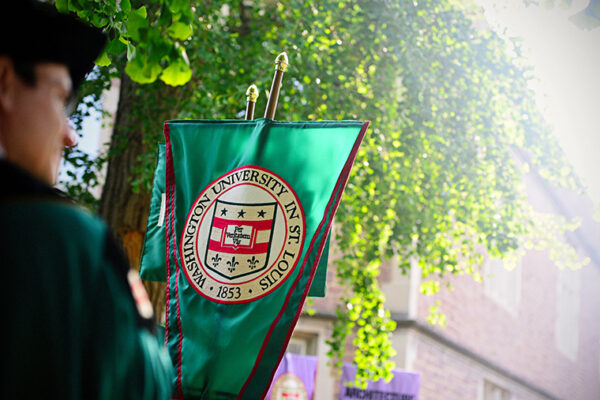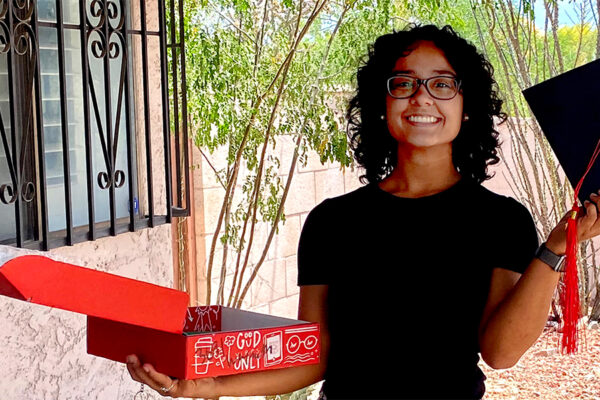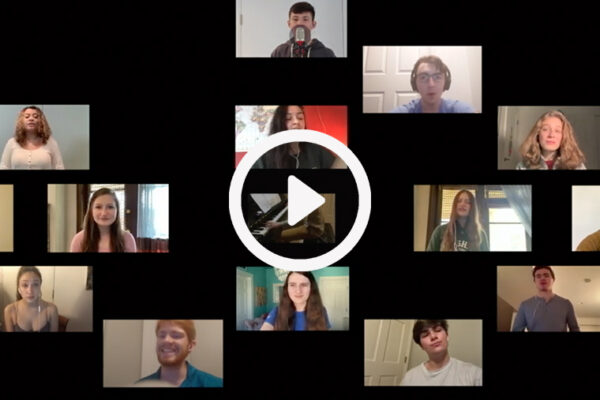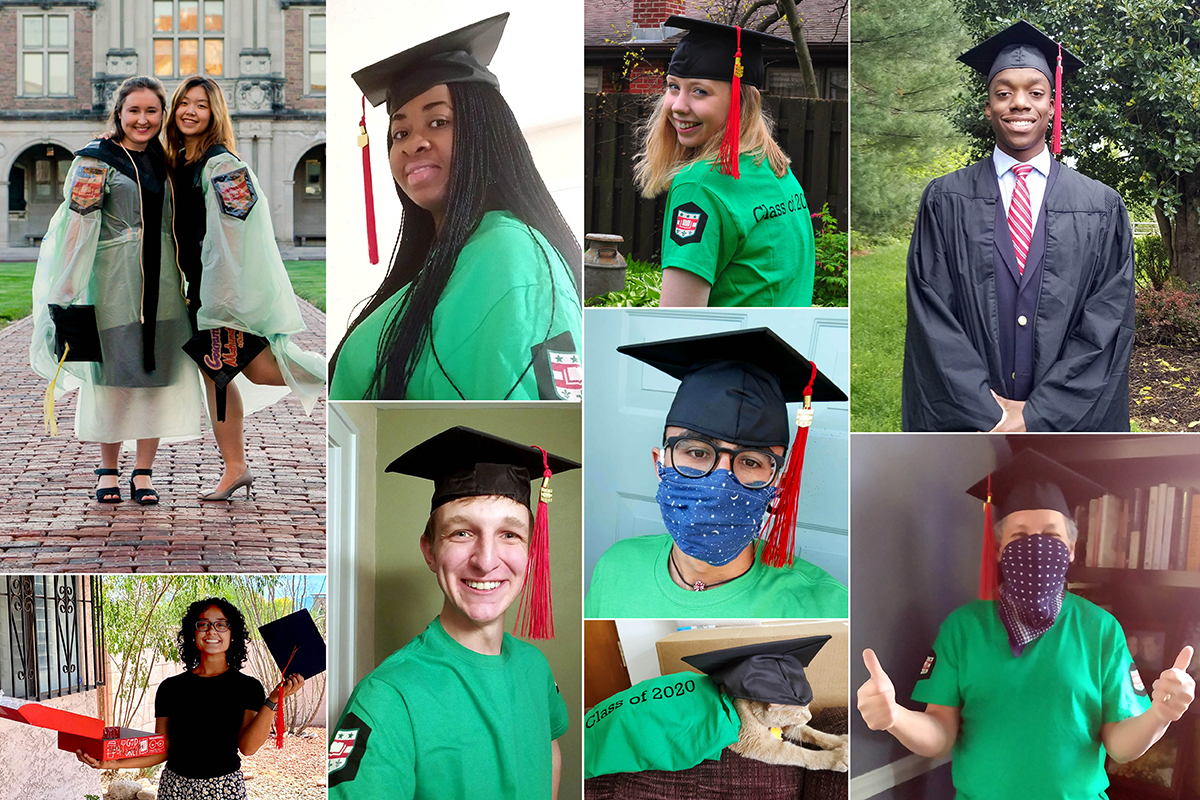
Across St. Louis, America and the globe, the 3,298 graduates of Washington University in St. Louis gathered in front of screens May 14-15 to watch recognition ceremonies for schools, academic departments and affinity groups. The virtual events replaced on-campus Commencement, which was postponed for the first time in university history due to the coronavirus pandemic.
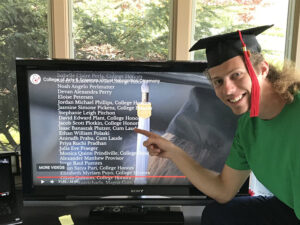
Like a traditional Commencement, the online ceremonies boasted heartfelt speeches, faculty adorned in full regalia and a solemn rendition of “Pomp and Circumstance.” But this was no regular Commencement, speaker and graduating senior Ruth Durrell told Arts & Sciences students.
“All of this is completely wack,” Durrell said in her video message. “We’re all supposed to be in our caps and gowns sitting in Brookings Quad sweating like crazy. Instead, we are in a global pandemic.”
Still, Durrell continued, students deserve a moment to rejoice in their accomplishments and imagine how they can best serve a suffering world.
“Graduating from WashU is a beautiful opportunity and gift,” Durrell said. “But it is also an immense responsibility. As graduates of this university, it is our responsibility to be good and do good by others.”
For deans at Washington University, that goodness can take many forms.
In his message to graduates, Carmon Colangelo, the Ralph J. Nagel Dean of the Sam Fox School of Design & Visual Arts and the E. Desmond Lee Professor for Collaboration in the Arts, urged students to design a post-COVID-19 world that is more equitable.
“How do we design our cities, our transportation systems, our restaurants, classrooms and public spaces to mitigate risk but also maintain human connection,” Colangelo asked. “How do we communicate and share information in ways that are clear and truthful? How do we continue to nourish the soul?”

Mary McKay, the Neidorff Family and Centene Corporation Dean of the Brown School, thanked students for joining professions that often serve on the front lines.
“In the few weeks since this pandemic has changed lives, I’m grateful that you have come together to meet the challenge,” McKay said. “Because extraordinary times call for extraordinary people — like you — it is our privilege to recognize you.”
Aaron Bobick, dean of the McKelvey School of Engineering and the James M. McKelvey Professor, told graduates the world needs them more than ever.
“The experience of this pandemic has exposed numerous challenges, not just in public health and medicine, but societal and industrial systems of all forms that will need to be addressed,” Bobick said. “And they need to be addressed by fearless problem solvers.”
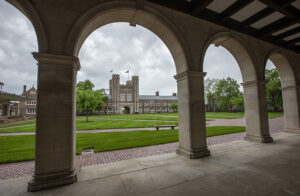
And David H. Perlmutter, MD, the George and Carol Bauer Dean of the School of Medicine and executive vice chancellor for medical affairs, expressed his admiration for the graduates who, time and again, have worked to make the world better, safer and more equitable.
“Today, as we officially welcome you into our ranks, we must acknowledge that we are sending you out into a world full of unknowns,” Perlmutter said. “You are heading out into a more uncertain medical landscape than any previous graduating class has encountered. This, too, you are ready for.”
Speakers also urged students to protect themselves — emotionally and physically. Self-care is not a common Commencement theme, but neither is global devastation.
“My advice to all of you at this time is be kind to yourself and to be still,” said Travis Tucker, assistant director of leadership and LGBTQIA involvement, during the Lavender Recognition Ceremony.
“What I wish for you all now is a few minutes to be still on a nice day, time to be with a loved one,” echoed Pat Matthews, associate dean at University College, who delivered a message for the affinity ceremony dedicated to students with children.
Chancellor Andrew D. Martin also encouraged students to treat themselves and one another with empathy and compassion.
“Making that turn into the Quad is always a really moving moment, but today, I was the only one there. To be honest, it made me really sad.”
Chancellor Andrew D. Martin
“Find ways to live in the present moment, to not let uncertainty overcome your thoughts, and to find ways to use these moments of adversity to learn and grow,” Martin said in his video message. “To find new ways of coping, new ways of doing and new ways of relating to one another and the world around you.”
Like members of the Class of 2020, Martin spent his Commencement day imagining what should have been. On his daily walk, he strode down Oak Allée through the Ridgley Hall colonnade, the same route he traveled for Commencements past when he was a faculty member and last year as chancellor-elect.
“Making that turn into the Quad is always a really moving moment, but today, I was the only one there,” Martin said. “To be honest, it made me really sad.”
Martin has taken solace in online celebrations — the Buder Blessing, graduating senior Semhar Mekonnen’s performance of “In My Life” and various school and department ceremonies, each one unique and authentic. He also is excited that the Class of 2020 will reunite on May 30, 2021, for an on-campus Commencement.
“Commencement is so meaningful for students, but it’s also incredibly meaningful for the faculty and staff who work so closely with these students and care so deeply about their futures,” Martin said. “We’re going to double down and really make it right next year.”
WashU Response to COVID-19
Visit coronavirus.wustl.edu for the latest information about WashU updates and policies. See all stories related to COVID-19.
